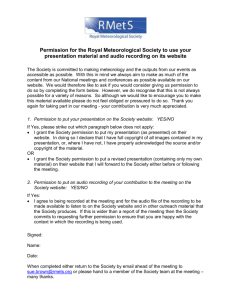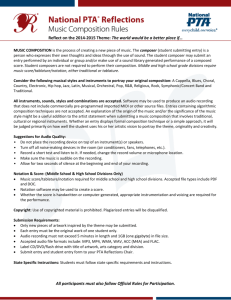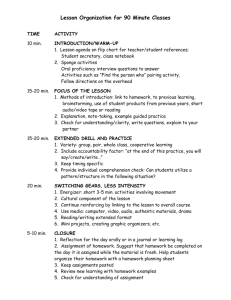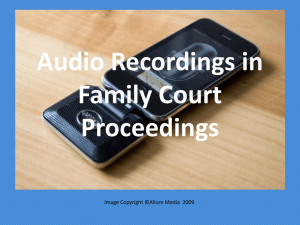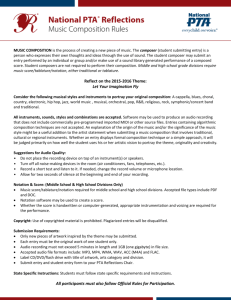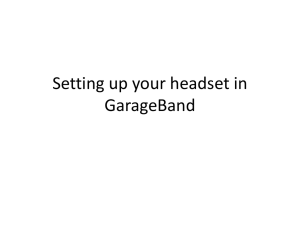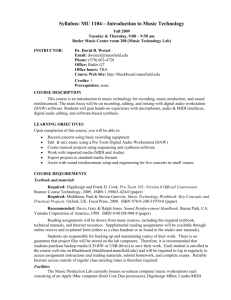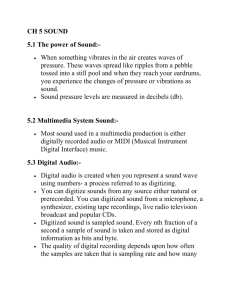Syllabus - Angelina College
advertisement
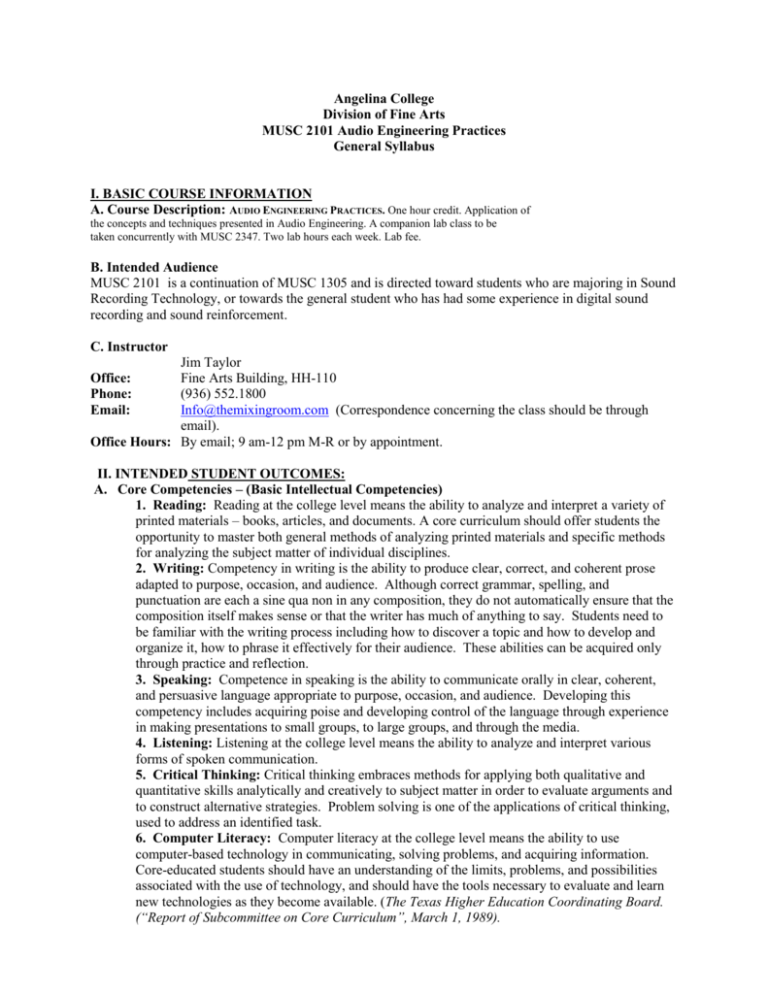
Angelina College Division of Fine Arts MUSC 2101 Audio Engineering Practices General Syllabus I. BASIC COURSE INFORMATION A. Course Description: AUDIO ENGINEERING PRACTICES. One hour credit. Application of the concepts and techniques presented in Audio Engineering. A companion lab class to be taken concurrently with MUSC 2347. Two lab hours each week. Lab fee. B. Intended Audience MUSC 2101 is a continuation of MUSC 1305 and is directed toward students who are majoring in Sound Recording Technology, or towards the general student who has had some experience in digital sound recording and sound reinforcement. C. Instructor Jim Taylor Fine Arts Building, HH-110 (936) 552.1800 Info@themixingroom.com (Correspondence concerning the class should be through email). Office Hours: By email; 9 am-12 pm M-R or by appointment. Office: Phone: Email: II. INTENDED STUDENT OUTCOMES: A. Core Competencies – (Basic Intellectual Competencies) 1. Reading: Reading at the college level means the ability to analyze and interpret a variety of printed materials – books, articles, and documents. A core curriculum should offer students the opportunity to master both general methods of analyzing printed materials and specific methods for analyzing the subject matter of individual disciplines. 2. Writing: Competency in writing is the ability to produce clear, correct, and coherent prose adapted to purpose, occasion, and audience. Although correct grammar, spelling, and punctuation are each a sine qua non in any composition, they do not automatically ensure that the composition itself makes sense or that the writer has much of anything to say. Students need to be familiar with the writing process including how to discover a topic and how to develop and organize it, how to phrase it effectively for their audience. These abilities can be acquired only through practice and reflection. 3. Speaking: Competence in speaking is the ability to communicate orally in clear, coherent, and persuasive language appropriate to purpose, occasion, and audience. Developing this competency includes acquiring poise and developing control of the language through experience in making presentations to small groups, to large groups, and through the media. 4. Listening: Listening at the college level means the ability to analyze and interpret various forms of spoken communication. 5. Critical Thinking: Critical thinking embraces methods for applying both qualitative and quantitative skills analytically and creatively to subject matter in order to evaluate arguments and to construct alternative strategies. Problem solving is one of the applications of critical thinking, used to address an identified task. 6. Computer Literacy: Computer literacy at the college level means the ability to use computer-based technology in communicating, solving problems, and acquiring information. Core-educated students should have an understanding of the limits, problems, and possibilities associated with the use of technology, and should have the tools necessary to evaluate and learn new technologies as they become available. (The Texas Higher Education Coordinating Board. (“Report of Subcommittee on Core Curriculum”, March 1, 1989). B. Exemplary Objectives – (Found in the Texas Higher Education Coordinating Board Document. Titled: CORE CURRICULUM: ASSUMPTIONS AND DEFINING CHARACTERISTICS Dated: April 1998) 1. To demonstrate awareness of the scope and variety of works in the arts and humanities 2. To understand those works as expressions of individual and human values within an historical and social context 3. To respond critically to works in the arts and humanities 4. To engage in the creative process or interpretive performance and comprehend the physical and intellectual demands required of the author or visual or performing artist 5. To articulate an informed personal reaction to works in the arts and humanities 6. To develop an appreciation for the aesthetic principles that guide or govern the humanities and arts 7. To demonstrate knowledge of the influence of literature, philosophy, and/or the arts on intercultural experiences. C. Course Objective 1. Students will learn to record and edit audio and MIDI data. 2. Students will learn to import audio and MIDI. 3. Students will be able to utilize virtual musical instruments. 4. Students will be able to understand basic audio flow. 5. Students will be able to configure inserts and sends on tracks. 6. Students will learn to record and edit musical automation. 7. Students will learn to create audio CDs f class music projects. 8. Students will learn to backup and archive music projects. D. Course Objective The primary objective for the student will be to gain a solid foundation in the fundamental, theoretical, and technical aspects of sound as it applies to reinforcement and recording. In addition, the student will become familiar with fundamental concepts of digital recording and mixing. III. ASSESSMENT MEASURES OF STUDENT LEARNING OUTCOMES: A. Assessments for the Core Intellectual Competencies – 1. Reading-Text assignments, handouts, and periodical articles relating to specific topics. Reading will be assessed through testing student’s comprehension of assigned material. 2. Writing-Reinforced through taking notes, written homework assignments, and research papers. Writing will be assessed through evaluation of student written assignments. 3. Speaking-Students will participate in class discussion, and will be graded on participation, and presentation over covered concepts. 4. Listening-Students will aurally identify specific styles, instrumentation, harmonic content and artist. Listening will be assessed through testing student’s ability to identify and record these concepts. 5. Critical Thinking-Students will develop critical thinking skills through analysis and evaluation of music recordings for EQ, balance, effects, and for harmonic content. Students will use information and techniques learned in class to draw conclusions. 6. Computer Literacy-Students will learn to use digital recording and mixing software and access the companion website for additional material B. Assessments for the Exemplary Objectives Specific to the Course 1. Students will demonstrate knowledge of sound recording and reinforcement techniques, and show an understanding of signal flow. C. Assessments for Objectives Specific to the Course – 1. Students will demonstrate recording and editing audio and MIDI data. 2. Students will demonstrate importing audio and MIDI. 3. Students will demonstrate utilization of virtual musical instruments. 4. Students will demonstrate an understanding of basic audio flow. 5. Students will demonstrate configuration, inserts and sends on tracks. 6. Students will demonstrate recording and editing musical automation. 7. Students will create audio CDs of class music projects. 8. Students will demonstrate how to backup and archive music projects. IV. INSTRUCTIONAL PROCEDURES 1. Lecture using the text and additional handouts. 2. Lab time will be logged in the computer lab. 3. Individual projects as assigned. V. COURSE REQUIREMENTS AND POLICIES: A. Required Textbooks, Materials and Equipment 1. Portable Hard dive 2. Headphones with a ¼ adapter B. Assignments – See attached Class Outline for the specific assignments by Unit. C. Course Policies – (This course conforms to the policies of Angelina College as stated in the Angelina College Handbook.) There will be no make-ups on exams unless you have contacted me in advance with a legitimate excuse. An excused absence is defined as a death in the immediate family or illness requiring medical attention and is excused only by a signed note from your physician or the campus nurse. Additional extenuating circumstances may arise constituting the possibility for an excused absence; however, the student must give advance notification to the instructor in order to be considered as such. Any and all assignments missed are the responsibility of the student and must be completed and turned in by the posted deadline. Academic Assistance Students with academically-related problems stemming from individual disabilities (as cited in Section 504 of the Rehabilitation Act of 1973 or Title II of the Americans with Disabilities Act of 1990) may request help from their instructors, department/division chair, or by contacting Karen Bowser in the Special Students support Office, Rm C200- C-Phone-633-5230 or 633-5209. To report any complaints of discrimination related to disability, you should contact Dr. Patricia McKenzie, Administration Building, Room 105 or 936-633-5201. Attendance – (Attendance requirements are outlined in the student handbook.) This class requires exceptional self-discipline and regular study. It is imperative that you set aside several hours every day to devote to study. If you are having problems with any aspect of this course, please do not hesitate to contact me as soon as possible. If you feel, after consultation with me, you can no longer continue in the class, normal drop procedures (as outlined in the student handbook) should be followed. Failure to do so will result in a “WF”, which translates in terms of GPA as an “F Additional Specific Requirements for this Course You will be required to set up, record, and mix one concert. The concerts will be assigned at the beginning of each semester. In addition to the content requirement listed in your text, a report containing information concerning time, date, and location of the performance, name of the group, instrumentation and a complete recording log must accompany your recording. Due date will be posted. These reports will count as 20% of your grade. I will be available online during the posted office hours, or you can call my office phone and leave a message with your question, and a return phone number and time availability. I will respond within 24hrs. or less. All correspondence will be through email. . VI. COURSE CONTENT: A. Content/ Topics 1. Students will be exposed to the fundamentals of sound reinforcement and digital recording as it will apply to the current job market. B. Additional Content Students will become familiar with music notational programs and will be assigned projects utilizing these resources. VII. EVALUATION AND GRADING: A. Grading Criteria All assignments and quizzes are due as posted in the academic syllabus and/or on blackboard. Try not to leave assignments to the last minute. Any work turned in late will have points deducted for every hour past the deadline. After 12:00 pm on the due day, late work will not be accepted and a zero will be recorded. There will be a number of practice quizzes over previously covered material which, with your daily assignments, will become part of your daily average. The lowest of these grades will be dropped. No make-ups on exams without prior notification of a legitimate conflict. Grading procedure will be as follows: Grading Scale 85-100 = A 75-84 = B 65-74 = C 55-64 = D < 54 = F
